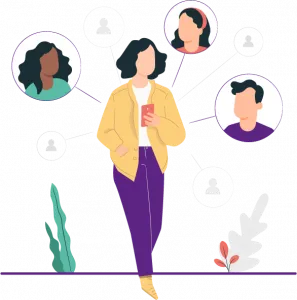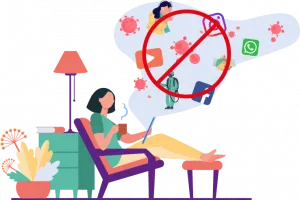Psychologist | 5 min read
Coping With Anxiety During the Pandemic
Medically reviewed by
Table of Content
Key Takeaways
- The coronavirus pandemic has disrupted daily life around the world
- improve your sense of control over your health and safety, and thereby reduce your anxiety about the illness
- If you find you’re unable to cope on your own, rest assured that there are plenty of resources available
The coronavirus pandemic has disrupted daily life around the world, and the future remains largely uncertain. From job loss to social isolation, the world has been forced to face extreme consequences as a result of the virus—all in addition to the constant threat of infection. It is understandable that almost everyone is experiencing a sense of grief, stress and anxiety, which is only exacerbated by the lack of social contact with friends and family.

It is important to be aware of the spread and impact of COVID-19, so that you can stay as safe as possible. Scientists are discovering new information about the virus every day and staying up-to-date will help you make informed decisions about what precautions you need to take. However, viral content on social media from unverified sources can contain misinformation or sensationalized reporting, so make it a point to follow the news through reputed journalists and healthcare professionals only. Getting the right information will help you take the right precautions, improve your sense of control over your health and safety, and thereby reduce your anxiety about the illness.
Limit your screen time
While staying informed is important, it is equally important to take time away from the news and social media, and limit your screen time to give your brain a rest. It has been reported by neurobiologists that excessive screen time can negatively impact brain function, and even distort your ability to learn and process new information.
Additionally, social media has been proven to trigger a dopamine response cycle that is extremely addictive, and can leave you feeling stressed and exhausted at the end of the day. Spending time away from your screens can help you develop healthier brain function and improve your cognitive health, and consequently put you in a better mood.

Exercise regularly
Exercise doesn’t simply improve your fitness—it also has proven benefits on your mental health. Physical activity triggers the release of mood-boosting neurochemicals in the brain, and even a short workout can leave you feeling happy, positive and relaxed for the rest of the day. Regular aerobic exercise can also help relax your muscles, thereby reducing the physical manifestations of stress such as restlessness or muscle tension.
What’s more, achieving fitness goals can improve your self-image and confidence, which greatly benefits your mental health. Find an activity you enjoy—whether it is lifting weights at home, taking a walk around your neighbourhood or signing up for an online dance class. A workout that you enjoy can be a source of joy in your routine and give you something to look forward to.
Additional Read: Tips for COVID-19 care with existing medical conditionsEat well to boost mental and physical health
Eating healthy, nutritious meals provides your body with the energy and nutrients it needs to function well. If your body is not getting the right nutrition, you may find yourself low on energy and unproductive through the day—which in turn contributes to stress, anxiety and even depression.
Eat nutrient-rich foods like fresh fruit, vegetables, nuts and eggs to fuel your body’s metabolism, and avoid caffeine, excess sugar, and nicotine, since these can severely disrupt your natural metabolic function. Eating right can also boost your immunity, allowing you to feel more confident about keeping infections at bay. Doctors have even suggested that specific foods such as eggs, dark chocolate, chamomile tea and turmeric can help alleviate the symptoms of anxiety.
Practice sleep hygiene
Getting a good night’s sleep is crucial to managing your anxiety through the day. Sleep hygiene is a term coined by medical professionals to describe healthy sleep habits. This means going to sleep and waking up at the same time every day, leaving your electronic devices outside the bedroom, and avoiding large meals or caffeine before bedtime.
Working from home may have impacted your ability to separate your personal and professional life, but avoid working from your bedroom if possible. Encourage your mind to see your bedroom as a place of calm and rest, and you’ll find your sleep quality greatly improve.
Write a daily journal
Mental health professionals have stated that maintaining a personal diary can help you process your thoughts, especially during times of stress or anxiety. As you write your thoughts, your mind gains a more objective perspective on your negative feelings, many of which you may find to be unfounded.
By journaling, you are also giving yourself an opportunity to prioritize your concerns and come up with productive solutions to your problems. Writing with pen and paper can make the process a lot more soothing and intimate—and also allows you to take time away from your screens.
Talk to a professional
Talking to a professional counsellor or therapist is the most effective way of treating anxiety and stress. Mental health professionals can offer you guidance that is specific to your circumstances, and help you stay objective and focused even when you’re feeling helpless and vulnerable. Finding a therapist that is right for you may take some research, but almost all healthcare professionals are now offering virtual consultations so you are no longer limited to your immediate geographical area. If you find you’re unable to cope on your own, rest assured that there are plenty of resources available to you.

Find the best doctor for the job on Bajaj Finserv Health. Locate a therapist near you in minutes. View doctors’ years of experience, consulting hours, fees and more before booking an e-consult or in-person appointment. Apart from facilitating appointment booking, the Bajaj Finserv Health also offers health plans for your family, medicine reminders, healthcare information and discounts from select hospitals and clinics.
References
- https://www.psychologytoday.com/us/blog/mental-wealth/201402/gray-matters-too-much-screen-time-damages-the-brain
- https://www.health.harvard.edu/staying-healthy/exercising-to-relax
- https://www.medicalnewstoday.com/articles/322652#nine-foods-to-eat-to-help-reduce-anxiety
- https://www.cdc.gov/sleep/about_sleep/sleep_hygiene.html
- https://www.urmc.rochester.edu/encyclopedia/content.aspx?ContentID=4552&ContentTypeID=1,
Disclaimer
Please note that this article is solely meant for informational purposes and Bajaj Finserv Health Limited (“BFHL”) does not shoulder any responsibility of the views/advice/information expressed/given by the writer/reviewer/originator. This article should not be considered as a substitute for any medical advice, diagnosis or treatment. Always consult with your trusted physician/qualified healthcare professional to evaluate your medical condition. The above article has been reviewed by a qualified doctor and BFHL is not responsible for any damages for any information or services provided by any third party.





